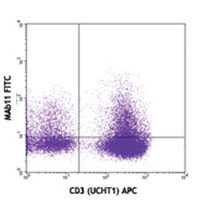Sodium Pyruvate Modulates Cell Death Pathways in HaCaT Keratinocytes Exposed to Half-Mustard Gas.
Paromov V, Brannon M, Kumari S, Samala M, Qui M, Smith M, Stone W
Int J Toxicol
2011
Show Abstract
2-Chloroethyl ethyl sulfide (CEES) or half-mustard gas, a sulfur mustard (HD) analog, is a genotoxic agent that causes oxidative stress and induces both apoptotic and necrotic cell death. Sodium pyruvate induced a necrosis-to-apoptosis shift in HaCaT cells exposed to CEES levels ≤ 1.5 mmol/L and lowered markers of DNA damage, oxidative stress, and inflammation. This study provides a rationale for the future development of multicomponent therapies for HD toxicity in the skin. We hypothesize that a combination of pyruvates with scavengers/antioxidants encapsulated in liposomes for optimal local delivery should be therapeutically beneficial against HD-induced skin injury. However, the latter suggestion should be verified in animal models exposed to HD. | 21300769
 |
Inflammatory cytokine levels are influenced by interactions between THP-1 monocytic, U-373 MG astrocytic, and SH-SY5Y neuronal cell lines of human origin.
Klegeris, A and McGeer, P L
Neurosci. Lett., 313: 41-4 (2001)
2001
Show Abstract
We measured the secretion of interleukin (IL)1beta, IL-6 and tumor necrosis factor-alpha (TNF-alpha) from human monocytic (THP-1), astrocytic (U-373 MG) and neuronal (SH-SY5Y) cell lines alone and in co-culture, with and without stimulation by a combination of lipopolysaccharide (LPS) plus interferon-gamma (IFN-gamma) or amyloid beta peptide 1-40 (Abeta). LPS+IFN-gamma stimulation increased IL-1beta secretion 16-fold from THP-1 cells. It increased IL-6 secretion 23-fold from THP-1 cells and 2.5-fold from U-373 MG cells. It increased TNF-alpha secretion 3.4-fold from THP-1 cells, but did not influence its secretion from U-373 MG cells. It did not affect the secretion of any of the cytokines from SH-SY5Y cells. Abeta stimulation increased IL-6 secretion 2.3-fold from U-373 MG cells but did not influence secretion of IL-1beta or TNF-alpha. Abeta stimulation also failed to influence secretion of any of the cytokines from THP-1 or SH-SY5Y cells. When THP-1 and U-373 MG cells were cocultured, IL-1beta and IL-6 secretion, but not TNF-alpha secretion, were significantly reduced from the levels obtained in independent cultures, suggesting that a mutual suppressive action may occur between microglia and astrocytes. | 11684335
 |
TNF-alpha messenger RNA and protein expression in the uteroplacental unit of mice with pregnancy loss.
Gorivodsky, M, et al.
J. Immunol., 160: 4280-8 (1998)
1998
Show Abstract
An elevated expression of TNF-alpha in embryonic microenvironment was found to be associated with postimplantation loss. In this work, we examined the pattern of TNF-alpha expression at both the mRNA and the protein level as well as the distribution of TNF-alpha receptor mRNA in the uteroplacental unit of mice with induced (cyclophosphamide-treated) or spontaneous (CBA/J x DBA/2J mouse combination) pregnancy loss. RNase protection analysis demonstrated an increase in TNF-alpha mRNA expression in the placentae of mice with pregnancy loss compared with that in control mice. TNF-alpha messages were localized to the uterine epithelium and stroma as well as the giant and spongiotrophoblast cells of the placenta. The intensity of the hybridization signal in placentae of mice with pregnancy loss was substantially higher than that in control mice. The up-regulation of TNF-alpha mRNA was accompanied by an increase in the expression of TNF-alpha receptor I mRNA in the same cell populations. The elevation of TNF-alpha production was also demonstrated at the protein level. Western blot analysis showed an increased level of the 18- and 26-kDa TNF-alpha protein species in the uteroplacental unit of mice with pregnancy loss. Immunostaining revealed TNF-alpha-positive leukocytes located in the uterus and placenta. Finally, we found that immunization of mice with cyclophosphamide-induced pregnancy loss while decreasing the resorption rate in these females resulted in a decline in TNF-alpha expression at the fetomaternal interface. These data clearly suggest an involvement of TNF-alpha in pathways leading to both spontaneous and induced placental death. | 9574530
 |











